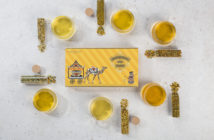Many people deal with Seasonal Affective Disorder as the days get shorter, and it only gets worse once we turn back the clocks.
Seasonal Affective Disorder (SAD), for those who aren’t aware, is a form of depression that occurs seasonally. While no one is quite sure what causes it, many experts currently believe that it is triggered by the lack of sunlight common during the fall and winter months. Along with depression, people who deal with SAD usually experience mood swings, anxiety, tiredness, weight gain, and a craving for carbs.
So, how can tea help?
Seek Out Mood Boosting Herbs
St. John’s wort, or hypericum, has long been used as a natural remedy for depression due to its ability to act as a serotonin reuptake inhibitor, similar to commonly prescribed antidepressants. Research studies done by German and Austrian scientists in the 1990s confirmed that the old naturopaths might have been on to something, suggesting St. John’s wort as a possible efficient treatment for SAD.
Hypericum can be taken as a tea, and all aerial parts of the plant have medicinal affects. Yogi even makes a Blues Away tea that specifically features the herb. One word of caution, though: St. John’s wort can interact with other drugs, so if you are taking birth control pills or are already on antidepressants, talk to your doctor before adding this tea to your winter medicine cabinet.
Ginseng is another terrific tea ingredient for fighting SAD, not because it busts depression the way hypericum does but because it’s a serious mood and energy booster. This medicinal root, which is commonly found in North America as well as eastern Asia, can help to reduce mental distress and aid digestion as well as help the immune system. Again, those who are on antidepressants should use caution and consult a doctor before taking ginseng.
If you’re struggling with anxiety, lemon balm may help. Not only can this herb from the mint family help you to calm down, but it can also increase your mental functions, giving you greater clarity of thought and processing power. The leaves can be steeped for tea, and it also works wonderfully as aromatherapy (so stick your nose over the cup and breathe in!).
Download our free Wellness & Tea 101 E-Book
Be Careful of Caffeine
It’s tempting to turn to caffeine when SAD saps your energy, but be careful — too much of a good thing can upset your stomach and cause anxiety as well as keep you up all night pacing the floors instead of getting the rest you need. Before bed, stick to herbals like chamomile, lavender, valerian root, and passionflower to relax your body and mind, or try the aforementioned ginseng to get your energy levels pumping during the day.
Focus On Daily Ritual
When depression hits, self-care rituals can keep you from going over the edge. Rituals are something you do regularly, and they provide a calming influence as well as an event you can count on and look forward to.
Your daily cup of tea is perfect for this. Set aside a specified amount of time, at the same time each day, and stick to it. Use your prep time — boiling the water, measuring the tea leaves, steeping — to calm yourself and to focus on the here and now. Check in with yourself and be honest about how you are feeling and what you need. As you drink your tea, sit in a comfortable spot near things that make you happy or bring a smile to your face. Read a book, listen to music, or watch your favorite uplifting television show.
Remember: It’s not selfish, it’s medicine.
Sources:
https://www.organicfacts.net/health-benefits/beverage/health-benefits-of-ginseng-tea.html
http://www.ncbi.nlm.nih.gov/pubmed/9342767
http://www.ncbi.nlm.nih.gov/pubmed/7857504
http://naturopathconnect.com/articles/seasonal-affective-disorder-dietary/





